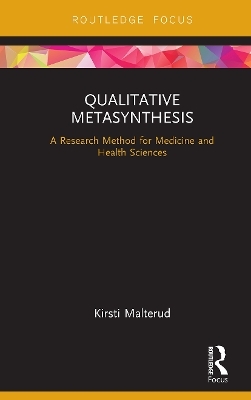
Qualitative Metasynthesis
Routledge (Verlag)
978-1-032-65354-9 (ISBN)
This book demonstrates how and why qualitative metasynthesis can be a method for reuse and expansion of medical knowledge. It presents the principles of metasynthesis as a qualitative research method, so that the reader can assess whether this is a research strategy that fits the aim of their study. The author offers practical advice for conducting research using this methodology. The presentation is illustrated by a study carried out by the author and collaborators, reflecting on real-life challenges and solutions as an example of meta-ethnography, one of the most frequently used strategies for qualitative metasynthesis. The author also looks at systematic reviews, a methodology developed within in the tradition of evidence-based medicine, discussing strengths, weaknesses and pitfalls of this methodology. Rooted in the interpretative paradigm, qualitative metasynthesis challenges several of the principles from the evidence-based medicine tradition, offering reflections on challenges when epistemologically very different methodologies intersect.
This book should be considered essential reading for anyone carrying out qualitative research within the fields of medicine, health and social care.
Kirsti Malterud, MD PhD, was a general practitioner for 35 years, combined with academic work as a researcher at Uni Research/NORCE Research Centre and a Professor of General Practice at the University of Bergen, Norway. Her list of research publications is extensive, with empirical studies about vulnerable groups of patients as well as methodological contributions on qualitative research methods.
Utilization and upcycling of existing research
knowledge
We do not have to start from scratch
Qualitative studies – an open mind, but no blank slates
Research waste or exploiting knowledge capital? Recycling, upcycling and sustainable
management of knowledge resources What will this book offer you?
The role of the nursing home doctor in end-of-life care – a concrete example
From chaos and individual research reports to systematic reviews
Comprehensive and critical reading of
the research literature The information deluge Broad mapping
Systematic reviews – a specific kind of research literature summary
Evidence from research results Multipurpose knowledge capital Evidence-based medicine
Different research questions require
different evidence from relevant methodologies
From summary and renarration to interpretation and synthesis Descriptive, interpretative or both? Meta-analysis
Qualitative metasynthesis
Which kinds of research questions can
be studied with qualitative metasynthesis?
Project planning and literature management
Careful preparations are profitable investments Summing up research – a stepwise process
A research question that is both flexible
and determined Choosing a strategy
The protocol 24
Registration of the project
Literature search
Overview and steady course
Search strategy
Search terms in logical combinations Search sources and databases
Grey literature
Language
Before you set off seriously
Screening and selection of potentially relevant primary studies Reference management
Systematic screening and rough classification Reading candidate articles in depth
with quality assessment Supplementary search
What characterizes your sample?
Flowsheet for search and selection Hallmarks of the primary studies Identification of results from the
primary studies
Organizing the material from data extraction
Analysis and synthesis
Interpretation of the results from the primary studies
Synthesis is more than summary and renarration
Levels of interpretation – concepts of first, second and third orders
Different strategies for metasynthesis
Meta-ethnography
Background
Metaphors and translations
Analytical perspectives
Strategy for analysis – seven steps The matrix as a tool for analysis
A specific example of analysis and synthesis Contemporary meta-ethnography
Other methods for qualitative metasynthesis Critical interpretive synthesis
Thematic synthesis
Realist synthesis
Reporting your study – writing the article
Elements in the article
Method, material and analysis Synthesis and results
Transparency in reporting qualitative metasyntheses
Theoretical and methodological challenges
Qualitative methods encounter evidence-based medicine
Scientific paradigms
Common features, differences and opposites
Social anthropology and metasynthesis
A complete and independent literature review?
Situated knowledges
Cherry picking
Finding the needle in the haystack Independent appraisals or bias?
Which evidence is the best evidence?
The evidence hierarchy
A universal gold standard?
Grading of evidence
New pyramids
Diversity or standardization of knowledge
Merging apples and oranges – the synthesis of heterogeneous data
Sustainable evidence
Three steps forward and two steps back
Grading of qualitative metasynthesis
Mixed methods and qualitative metasynthesis
Qualitative and quantitative methods in the same study
Multi-methodological exploration of complex research questions
Qualitative metasynthesis with mixed methods Synthesis of qualitative primary studies
with different designs
Final comments
Ethics and privacy protection Regulations and approvals
Distance as a challenge
Contributing something new
What do you need to conduct a qualitative metasynthesis?
Competence and experience
Relevant primary studies with useful presentations of results
Resources and personal traits
Set off!
You are not alone
Newer and more exciting Wheat or chaff?
Sustainable competence – new
opportunities for collaboration
References
Index
| Erscheinungsdatum | 22.08.2024 |
|---|---|
| Verlagsort | London |
| Sprache | englisch |
| Maße | 138 x 216 mm |
| Gewicht | 380 g |
| Themenwelt | Pflege ► Studiengänge ► Pflegewissenschaft |
| Studium ► Querschnittsbereiche ► Prävention / Gesundheitsförderung | |
| ISBN-10 | 1-032-65354-X / 103265354X |
| ISBN-13 | 978-1-032-65354-9 / 9781032653549 |
| Zustand | Neuware |
| Informationen gemäß Produktsicherheitsverordnung (GPSR) | |
| Haben Sie eine Frage zum Produkt? |
aus dem Bereich


